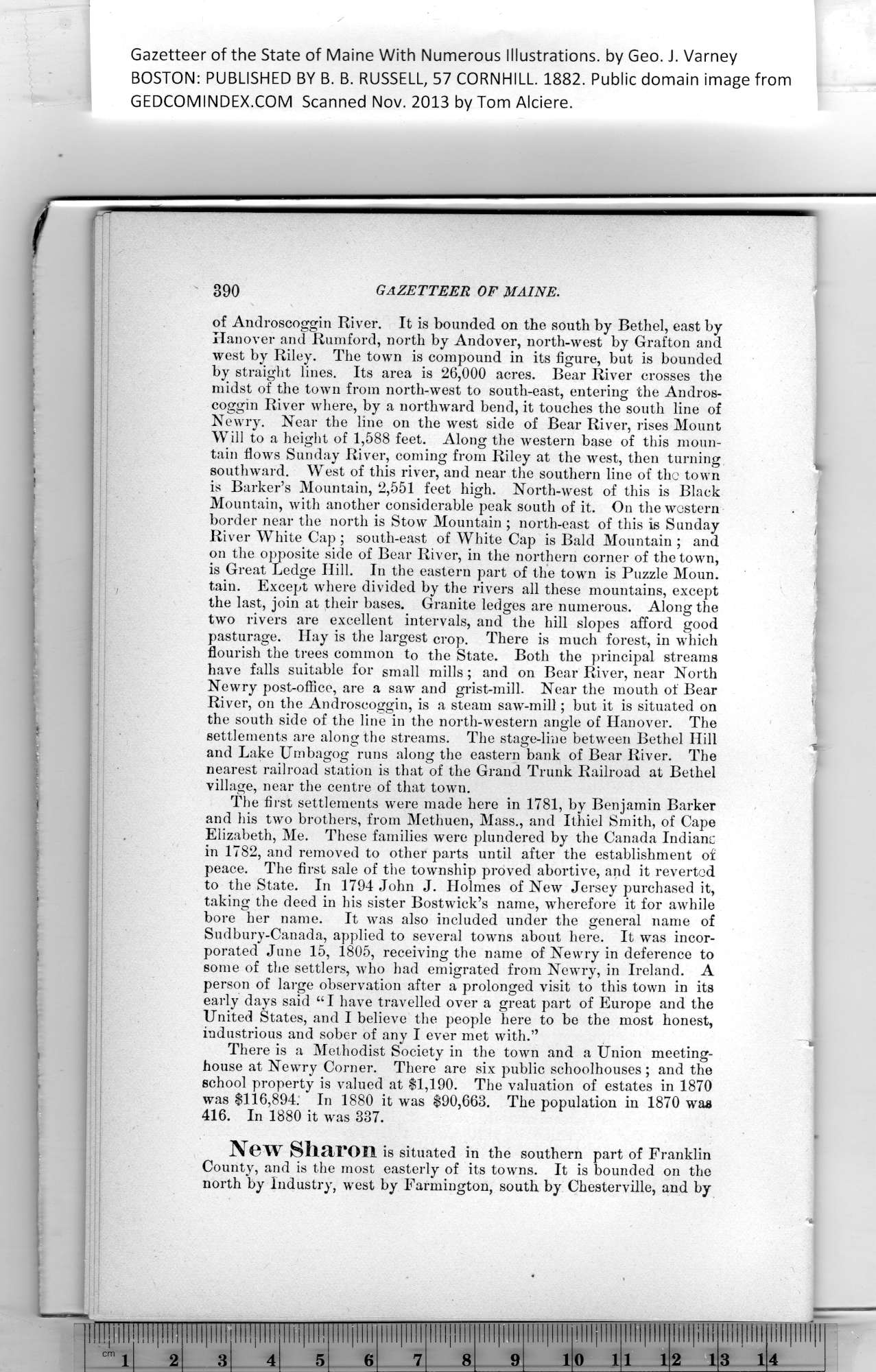|
Gazetteer of the State of Maine With Numerous Illustrations, by Geo. J. Varney
BOSTON: PUBLISHED BY B. B. RUSSELL, 57 CORNHILL. 1882. Public domain image from
390 GAZETTEER OF MAINE.
of Androscoggin River. It is bounded on the south by Bethel, east by
Hanover and Rumford, north by Andover, north-west by Grafton and
west by Riley. The town is compound in its figure, but is bounded
by straight lines. Its area is 26,000 acres. Bear River crosses the
midst of the town from north-west to south-east, entering the Andros-
coggin River where, by a northward bend, it touches the south line of
Newry. Near the line on the west side of Bear River, rises Mount
Will to a height of 1,588 feet. Along the western base of this moun-
tain flows Sunday River, coming from Riley at the west, then turning
southward. West of this river, and near the southern line of the town
is Barker’s Mountain, 2,551 feet high. North-west of this is Black
Mountain, with another considerable peak south of it. On the western
border near the north is Stow Mountain; north-east of this is Sunday
River White Cap ; south-east of White Cap is Bald Mountain ; and
on the opposite side of Bear River, in the northern corner of the town,
is Great Ledge Hill. In the eastern part of the town is Puzzle Moun.
tain. Except where divided by the rivers all these mountains, except
the last, join at their bases. Granite ledges are numerous. Along the
two rivers are excellent intervals, and the hill slopes afford good
pasturage. Hay is the largest crop. There is much forest, in which
flourish the trees common to the State. Both the principal streams
have falls suitable for small mills; and on Bear River, near North
Newry post-office, are a saw and grist-mill. Near the mouth of Bear
River, on the Androscoggin, is a steam saw-mill; but it is situated on
the south side of the line in the north-western angle of Hanover. The
settlements are along the streams. The stage-line between Bethel Hill
and Lake Umbagog runs along the eastern bank of Bear River. The
nearest railroad station is that of the Grand Trunk Railroad at Bethel
village, near the centre of that town.
The first settlements were made here in 1781, by Benjamin Barker
and his two brothers, from Methuen, Mass., and Ithiel Smith, of Cape
Elizabeth, Me. These families were plundered by the Canada Indianc
in 1782, and removed to other parts until after the establishment of
peace. The first sale of the township proved abortive, and it reverted
to the State. In 1794 John J. Holmes of New Jersey purchased it,
taking the deed in his sister Bostwick’s name, wherefore it for awhile
bore her name. It was also included under the general name of
Sudbury-Canada, applied to several towns about here. It was incor-
porated June 15, 1805, receiving the name of Newry in deference to
some of the settlers, who had emigrated from Newry, in Ireland. A
person of large observation after a prolonged visit to this town in its
early days said “I have travelled over a great part of Europe and the
United States, and I believe the people here to be the most honest,
industrious and sober of any I ever met with.”
There is a Methodist Society in the town and a Union meeting-
house at Newry Corner. There are six public schoolhouses ; and the
school property is valued at $1,190. The valuation of estates in 1870
was $116,894. In 1880 it was $90,663. The population in 1870 was
416. In 1880 it was 337.
New Sharon is situated in the southern part of Franklin
County, and is the most easterly of its towns. It is bounded on the
north by Industry, west by Farmington, south by Chesterville, and by
PREVIOUS PAGE ... NEXT PAGE
This page was written in HTML using a program written in Python 3.2
|
